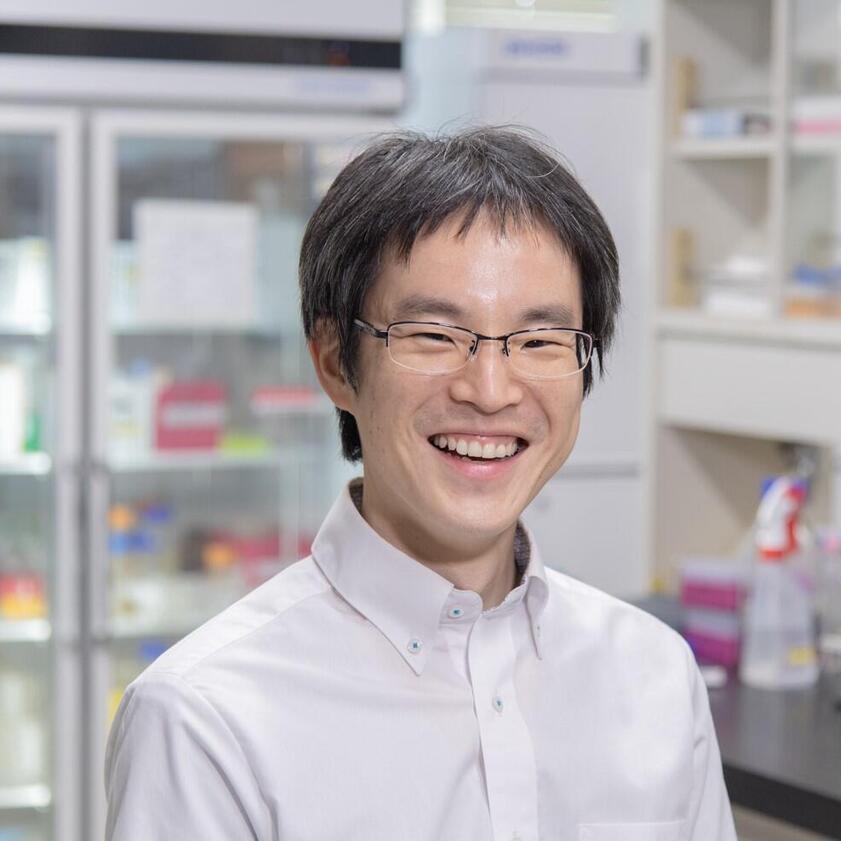Professor Ryuichiro Higashinaka

Researchers'
Associate Professor
Michitaka Notaguchi
Bioscience and Biotechnology Center
I chose this phrase because I have been working on basic research on plants for about 10 years since I graduated from graduate school with my degree. After 10 years, I finally felt like I was at the starting point of my research. Looking back now, I think I have been able to see the current landscape because I have continued to face the research themes I thought were interesting and that I should do, regardless of what anyone said.
I am conducting two types of research, like two sides of a coin. One is studying what kind of communication exists between the roots and above-ground parts of plants. Plants are known to carry various molecules in their bodies, which allows them to adapt to their surrounding environment and ecosystem. I want to know more about this elaborate way of life, so I am studying the information transmission mechanisms within individual plants. I am also studying the molecular mechanisms of grafting, a technique used in agriculture to connect two plants. In the first research, I used grafting as an experimental method.
I originally entered the university because I wanted to research human diseases. However, as I learned more, I realized there are many important things that support our lives, one of which is plants. Plants are food, fodder, raw materials, energy, and essential to our lives. When we eat fresh vegetables and delicious dishes made from them, we feel happiness. Such plants are exposed to problems such as global warming, farmland development, and decrease of biodiversity. Realizing this, I decided to take it seriously for the sake of the future.
There is a moment when I think I may have captured the smart way of life of plants in a scientific way, and I think that moment makes research incredibly interesting. The big discoveries come about once every year or so. I become so excited that I cannot sleep that night. Plants have evolved over the same period that humans evolved from single-celled organisms. Plants have developed their own very clever and excellent life systems. They are fascinating beings that we humans have not yet caught up with. I experience pure excitement when I realize I may have caught the first glimpse of this fascination.
A photo at a rose garden in Yamagata, Japan, which he visited with his research colleagues in November 2018
Since plants support our lives, I believe that we must coexist with plants in a mutual relationship in the future society. However, this cannot be achieved with limited knowledge and technology. I want to connect the wisdom gained from basic research at universities to proposals that contribute to a sustainable society and put them into practice. This is why I founded a university-launched venture. I will continue to take on challenges, but want to advance with my colleagues to do what I believe in.
I mainly worked from home. We are doing research in experimental science, so there is only so much we can do from home. However, we wanted to use it as an opportunity to contemplate our research in more depth than usual. We also believed this period would lead to our next growth period. The lack of exercise spurred me on and stressed me out. I think it is good to move your body through strength training and stretching.
Once when I was in graduate school, and once about five years ago, I almost collapsed because I thought I was not good enough as a researcher. When I was in graduate school, I could not find anything else I wanted to do, but decided to do my research until I was satisfied with it, which I was able to continue until I graduated. Five years ago, I was supported by many people I met. The more serious I became, the more self-critical I became. The more I challenged myself, the less I knew whether I would be able to break through. I am still half a person, but these experiences are my assets.
I want to challenge myself to do research that is truly botanical. I have always wanted to conduct research on plasmodesmata (please check it out), so I would like to use my experience and skills to tackle difficult problems. Through my research, I have also come up with several technologies that have the potential to be used in agriculture. Some are still in the idea stage, while others have already been developed to the practical stage by venture companies. I would like to continue my efforts as a researcher so that the results of basic research conducted at universities and other institutions can be used in society and lead to the happiness of others, and ensure that this becomes more common and natural.
Name: Michitaka Notaguchi
Department: Bioscience and Biotechnology Center
Title: Associate Professor
Career history and hobbies:
After receiving his PhD in 2009 from the Graduate School of Science, Kyoto University, he worked as a postdoctoral researcher at the University of California, Davis before moving to Nagoya University in 2012. He is a member of the Graduate School of Science, Institute for Advanced Research, Graduate School of Bioagricultural Sciences, Institute for Transformational Bio-Molecules, and Bioscience and Biotechnology Center. His hobbies are reading, talking with people, and above all, research.